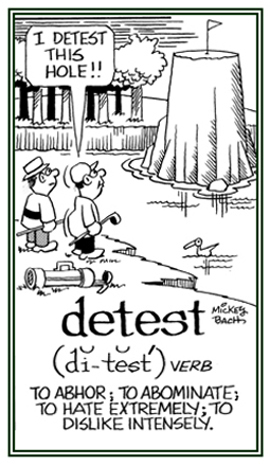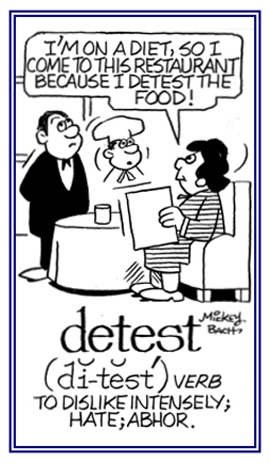testi-, test-
(Latin: a witness, one who stands by)
detest (verb), detests; detested; detesting
1. To dislike someone or something very much: James and Sara detest their landlord and so they are looking for another place to live.
2. To feel antipathy or aversion towards another person or situation: Margaret detests the heavy traffic when she drives to work.
3. Etymology: by way of French detester; from Latin detestari, "to bear witness against, to denounce" from testis, "witness".

© ALL rights are reserved.

© ALL rights are reserved.

© ALL rights are reserved.
Go to this Word A Day Revisited Index
2. To feel antipathy or aversion towards another person or situation: Margaret detests the heavy traffic when she drives to work.
3. Etymology: by way of French detester; from Latin detestari, "to bear witness against, to denounce" from testis, "witness".



Go to this Word A Day Revisited Index
so you can see more of Mickey Bach's cartoons.
detestable (adjective), more detestable, most detestable
Descriptive of something or of someone that deserves intense dislike or revulsion: The detestable and abhorrent behavior of the criminal was beyond belief!
detestably (adverb), more detestably, most detestably
Descriptive how someone or something can be offensive and hateful: Meg found the days so detestably dull and lousy when all of her friends were gone on vacation during the summer holidays.
Some of the people at the political gathering were so detestably immoral and vulgar that other people could not tolerate being anywhere near them.
An intense loathing or hatred for someone or something: Jane's neighbor had two dogs which caused her to have detestations about them because of their behavior of barking so much during the daytime and at night.
Someone who abhors or hates certain people, situations, or conditions.
Ille dolet vere, qui sine teste dolet (Latin phrase )
Translation: "He mourns honestly who mourns without witnesses." -Martialis
incontestably (adverb), more incontestably, most incontestably
1. Conveying how something is beyond being debatable or challenged: It is incontestably true that Sam didn't pass the exam because he answered all the questions incorrectly!
2. Relating to how it is impossible to question the accuracy of a fact because of its being obviously correct: It is incontestably true that the earth rotates around the sun.
3. Etymology: from Latin incontestabilis, from in-, "not" + contestabilis, "arguable."
2. Relating to how it is impossible to question the accuracy of a fact because of its being obviously correct: It is incontestably true that the earth rotates around the sun.
3. Etymology: from Latin incontestabilis, from in-, "not" + contestabilis, "arguable."
A condition in which someone has died without making a legally valid will: When Jane's father passed away, he did not provide an inheritance for her.
intestate (adjective) (not comparable)
1. A reference to a will which is not valid and that does not indicate to whom to leave one's estate after his or her death: Jerry's father died and his lawyer told his relatives that there was only an intestate presentation that existed that did not provide any specific information about what his relatives would receive.
2. Relating to a person who has not provided a legal testament: Since Jane's husband died quite unexpectedly and intestate, she, as his spouse, inherited the entire estate.

© ALL rights are reserved.
Go to this Word A Day Revisited Index
2. Relating to a person who has not provided a legal testament: Since Jane's husband died quite unexpectedly and intestate, she, as his spouse, inherited the entire estate.

Go to this Word A Day Revisited Index
so you can see more of Mickey Bach's cartoons.
obtest (verb), obtests, obtesting, obtested
1. To invoke someone as a witness: Jerome was obtested to confirm that he had seen what happened when a car crashed into another one.
2. To supplicate or to implore earnestly and to beseech another person to do something: Since Sara was walking on the sidewalk behind Joseph, she was asked to obtest that he fell down and was injured because of the icy surface in front of the store and not because of his clumsiness.
2. To supplicate or to implore earnestly and to beseech another person to do something: Since Sara was walking on the sidewalk behind Joseph, she was asked to obtest that he fell down and was injured because of the icy surface in front of the store and not because of his clumsiness.
1. A supplication or an entreaty to achieve something.
2. The act of protesting in earnest and with serious desires to accomplish worthy objectives.
2. The act of protesting in earnest and with serious desires to accomplish worthy objectives.
protest (verb), protests; protested; protesting
1. To express strong disapproval of or disagreement with something, or to refuse to obey or to accept something often by making a formal statement or taking action in public.
2. The act of protesting; an organized public manifestation of dissent.
3. To make a formal and a solemn declaration of objection.
4. The actions of making strong public expressions of disagreements and disapprovals: The crowd shouted their protests at the umpire's decision to penalize the football player.
2. The act of protesting; an organized public manifestation of dissent.
3. To make a formal and a solemn declaration of objection.
4. The actions of making strong public expressions of disagreements and disapprovals: The crowd shouted their protests at the umpire's decision to penalize the football player.
1. A member or adherent of any denomination of the Western Christian church that rejects papal authority and some fundamental Roman Catholic doctrines, and who believes in the justification by faith.
2. Any Western Christian who is not an adherent of a Catholic, Anglican, or Eastern Church.
2. A believer of any of those Christian bodies that separated from the Church of Rome during the Reformation, or of any group descended from them.
2. Any Western Christian who is not an adherent of a Catholic, Anglican, or Eastern Church.
2. A believer of any of those Christian bodies that separated from the Church of Rome during the Reformation, or of any group descended from them.
Anyone who makes a protest against some action.
1. A Christian religious movement originating in the 16th century from Martin Luther's attack on the Roman Catholic doctrine.
It grew to encompass many churches and denominations denying papal authority and believing in justification and salvation by faith.
2. The Protestant churches considered as a whole and who are adherents to Protestant beliefs.

